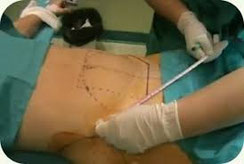Abdominoplasty

Indications: Excess skin and fat, high distension of abdomen muscles
Anesthesia: General
The incision: Around the navel and low cross located at the
pubis
Stay in clinic: 2 nights
Recovery: 10 to 15 days
What is
Is a cosmetic surgery procedure used to make the abdomen thinner and more firm. The surgery involves the removal of excess skin and fat from the middle and lower abdomen in order to tighten the muscle and fascia of the abdominal wall. This type of surgery is usually sought by patients with loose or sagging tissues after pregnancy or major weight loss.
Before the intervention
It is necessary to rule out cardiovascular, pulmonary
and coagulation problems.
In obese patients it is recommended, if possible, prior
thinning supervised by an endocrinologist.
Do not take aspirin for two weeks before and not smoking during the
previous three weeks.
The surgery

It is performed under general anesthesia and
lasts approximately 2 hours.
In general, a complete abdominoplasty follows these steps:
An incision is made from hip to hip just above the pubic area. Another incision is made to free the navel from the surrounding skin. The skin is detached from the abdominal wall to reveal the muscles and fascia to be tightened. The muscle fascia wall is tightened with sutures. Liposuction is often used to refine the transition zones of the abdominal sculpture.
After the surgery
The hospital stay is 2 nigths.
The most important thing is to avoid at all costs the tension in the
area of the scar.
You feel pain. They are normal bruises, edema, minor bleeding
and even some fever.
It is important to sleep on his back, resting the first two days
and avoid wetting the dressing while the sutures were not removed.
No violent activities or exercises will be held for
eight weeks.
It is advisable to wear a girdle for 2 to 4 weeks.
Results
The result is almost always excellent but the quality of the scar and the skin depends on the extent of the intervention.
The final result is visible to the 6 to 12 months.
The scar will improve but not completely disappear.
The result is even better if the patient monitors your weight and toning your abdomen.
Risks
The majority of the risks can be avoided if the patients follow carefully the instructions they receive from their surgeon. Severe complications occur however in rare cases and these include blood clots, thrombosis, cardiac and pulmonary complications or infection. One of the more common problems after an abdominoplasty is collection of fluid under the skin after the drains have been removed. A surgeon can aspirate the fluid with a needle. The drainage stops within a month and does not affect the final results.

|
Always read the terms and conditions when purchasing services or products |


